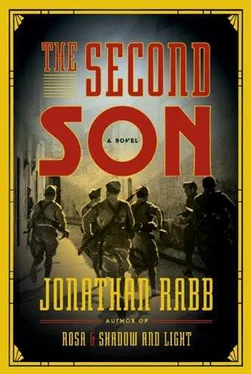Jonathan Rabb - The Second Son
Здесь есть возможность читать онлайн «Jonathan Rabb - The Second Son» весь текст электронной книги совершенно бесплатно (целиком полную версию без сокращений). В некоторых случаях можно слушать аудио, скачать через торрент в формате fb2 и присутствует краткое содержание. Жанр: Политический детектив, на английском языке. Описание произведения, (предисловие) а так же отзывы посетителей доступны на портале библиотеки ЛибКат.
- Название:The Second Son
- Автор:
- Жанр:
- Год:неизвестен
- ISBN:нет данных
- Рейтинг книги:4 / 5. Голосов: 1
-
Избранное:Добавить в избранное
- Отзывы:
-
Ваша оценка:
- 80
- 1
- 2
- 3
- 4
- 5
The Second Son: краткое содержание, описание и аннотация
Предлагаем к чтению аннотацию, описание, краткое содержание или предисловие (зависит от того, что написал сам автор книги «The Second Son»). Если вы не нашли необходимую информацию о книге — напишите в комментариях, мы постараемся отыскать её.
The Second Son — читать онлайн бесплатно полную книгу (весь текст) целиком
Ниже представлен текст книги, разбитый по страницам. Система сохранения места последней прочитанной страницы, позволяет с удобством читать онлайн бесплатно книгу «The Second Son», без необходимости каждый раз заново искать на чём Вы остановились. Поставьте закладку, и сможете в любой момент перейти на страницу, на которой закончили чтение.
Интервал:
Закладка:
The car lurched and heaved and finally pulled to a stop. The engine cut out, and the large captain, reaching for the handle, said, “You come too if you want. They won’t be able to see us down here.”
He pushed open the door and the sun streamed in, along with a spray of air that was breathable. Mila and Hoffner followed him.
They were perhaps thirty meters from the wall, safely behind the bombed remains of a house, an outpost of sorts, with enough of a view to see the spire of one of the fortress towers high above. Part of the fortress roof had been torn away-a few well-tossed grenades from an aeroplane-but for the time being, the Alcazar remained sufficiently intact. A man sat with a machine gun, while the driver of the Mercedes stood a few meters higher up the incline, pulling the explosives from the car and laying them on the grass. Another two remained behind the car, their rifles aimed up at the wall, the barrels moving slowly back and forth along the line of windows and ledges. For men who were convinced the rebels would be taking no notice, they were showing remarkable caution.
The man finished unloading the explosives and began to dart up to the base of the tower, keeping low, a brick in each hand. Five trips in, a man at the car shouted for him to stop. Something had caught his eye. Hoffner inched out and tried to see where he was looking.
Twenty meters above, a group of four women were being forced out onto a ledge, terror in their faces as they clutched at the stone. The barrel of a rifle appeared among them, followed by the shout of a man’s high-pitched voice: “These are your socialist whores! Move off or they join you down there!”
One of the women screamed and the large captain barked to his man to pull back to the car. The pile of explosives remained by the wall. The women pressed themselves into the siding and tried vainly to keep their dresses from billowing up in the wind.
The large captain said quietly to the man at the machine gun, “They’ve done this before?”
The man shook his head. “I didn’t think they knew we were here.”
“Then you were wrong.” The large captain stepped closer to the edge of the house and peered out. He shouted up to the wall, “My man is back.”
The voice shouted, “Don’t be smart. The explosives as well.”
The large captain shouted, “This is what you do, hide behind women? You’ll be dead in a week. Ask your God if this is what you want on your gravestones.”
“It won’t be me who’ll be rotting,” the voice shouted. “Take the bombs or you’ll be taking four more dead ones back with you.”
The large captain waited. He looked back at his men, then up to the ledge. “Is it easy to be such a coward?” he shouted.
“If these were women and not whores, I could tell you.”
It kept on like this, and Hoffner had no idea what the point was in staying. The explosives were barely enough to put a dent in the wall. It was empty posturing on both sides, until the crack of a bullet rang out and a single body fell from the ledge.
The silence was pure and instantaneous. Screams followed. The large captain yelled to his men not to fire, then shouts and threats echoed back and forth. It was unclear whether this had been intended or a mistake. Mila had suddenly begun moving to the edge of the house, to the dead woman, eyes blank, when Hoffner grabbed her and held her close. Mila’s body was rigid, her breathing short; it was all he could do to keep her with him.
Two more rifles appeared in the window, more threats, more screams, when a voice by the Mercedes shouted, “I will remove the explosives!” Everything fell silent.
Hoffner looked out and saw a soldier standing upright, his arms raised high. He held his rifle in the air and tossed it to the ground in front of him. He was staring up at the window.
“I will remove them,” he shouted again. “Take the women inside.”
A low wind moved across the grass. The soldier stood firm, his legs like thick stalks planted on the rise.
Slowly the rifles pulled back, and the voice said, “Get the explosives.”
The soldier made his way up. He raised the first of the bricks above his head and moved back to the car. He turned and repeated, “Take the women inside.”
This time the women were permitted to climb through. The soldier placed the explosive in the car and began to make his way up again.
Twenty minutes later, Hoffner sat with Mila and the large captain and the smell of piss as the cars made their way down the hill. No one had said a word. Her eyes remained empty, her face unmoving. Her breathing was quieter, but it was a stillness without calm. Hoffner had taken her hand-she had let him-but there was nothing in her grip.
A ditch in the road jolted them high off their seats, and Mila said, “You have a traitor in Toledo.” The sound of her voice jarred, even as her eyes remained empty. “A man who hides guns for the fascists. In crates. Thick crates.” The captain started to speak, and she said, “His name is Rivas. I have the address. You must find him and shoot him.”
They found Rivas. They found the wires from Bernhardt and the papers from Hisma. And they shot Rivas and his wife and his son, all three against a wall outside the house. There was no talk of the women at the Alcazar, nothing of explosives, only silence, as the large captain beat Rivas with such savagery that he was forced to prop the man beside his wife before stepping back and shooting them. There was blood on the captain’s trousers when he returned.
Mila and Hoffner saw the blood. They said nothing.
Georg was no longer in the city. A guard at one of the barricades had remembered the large camera and the German papers. He remembered because Georg had put him on film. It was two days ago. Georg was heading west.
The large captain told them that the Mercedes would stay in Toledo. The town of Coria lay within Nationalist Spain; there was no point in taking the car. Not with CNT-FAI scrawled across its doors. They found an old Ford for them, two seats, with a cracked windscreen and no paint on the side.
It was nine hours to the first of the Nationalist outposts. The large captain wished them good fortune and went to clean his trousers.
Hoffner drove, dirt and rock and distance ahead of them, and somewhere the darkness to come. It was hours of unbroken silence.
Finally Mila spoke. “I killed him.” She was staring out, her voice brittle like sand. Hoffner felt it on his cheek.
“No,” he said. “You didn’t.”
“The wife and the son.”
“No.”
“The girl fell and I-”
Hoffner brought the car to a sudden stop. The dust rose up, but she refused to look at him.
He had repeated the words a thousand times in his head, but still they caught in his throat: I brought her to this. I alone. She is guiltless; she will always be guiltless.
“There is nothing,” he said, “no moment you can point to and say, This is why a man is dead. Not now. Not in this Spain. This wasn’t for you.”
“No.” She continued to stare out. “You don’t understand.” At last she turned, her eyes clear and focused. “I saw the girl fall and I chose for Rivas to die. I would choose it again. The wife. The son. This isn’t guilt, Nikolai. I feel no sadness or despair. This is what it is to be in Spain; I know this now.” She stared across at him. “What I don’t know is if you can see it and choose to stay with me.”
Hoffner stared into the eyes, dry and spent. And he saw hope. Hope for himself. He had never imagined it.
“There is no choice,” he said. “I love you.”
He took her in his arms, and her face came up to his own. He knew he had given himself to her, and nothing as fleeting as doubt would ever enter his mind again. So he waited and let the unbearable sentiment of it take him. He kissed her. He felt the slenderness of her waist, the need in her hands as they pressed deep into him. And he found his breath and pulled back.
Читать дальшеИнтервал:
Закладка:
Похожие книги на «The Second Son»
Представляем Вашему вниманию похожие книги на «The Second Son» списком для выбора. Мы отобрали схожую по названию и смыслу литературу в надежде предоставить читателям больше вариантов отыскать новые, интересные, ещё непрочитанные произведения.
Обсуждение, отзывы о книге «The Second Son» и просто собственные мнения читателей. Оставьте ваши комментарии, напишите, что Вы думаете о произведении, его смысле или главных героях. Укажите что конкретно понравилось, а что нет, и почему Вы так считаете.












